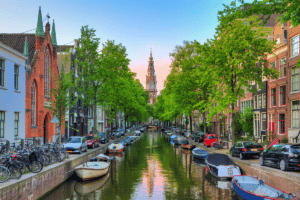Visa, Residency, and Citizenship in the Netherlands – that will be the topic of today’s article.
If you are looking to invest as an expat or high-net-worth individual, which is what I specialize in, you can email me (advice@adamfayed.com) or WhatsApp (+44-7393-450-837).
Introduction
I have personally searched various websites for this specific information about the Netherlands.
No particular website has in-depth information on this topic. This is quite troublesome for the people who seek residency in the Netherlands through investment.
That’s why I conducted some extensive research and came up with accurate information.
Today, I will shed some light on all the important aspects related to residency and citizenship in the Netherlands. More specifically about the Netherlands Investor Visa.
Before we go into the actual information, we will start by discussing some general information.
Let us start by discussing the different types of visas available for moving to the Netherlands.
Visas
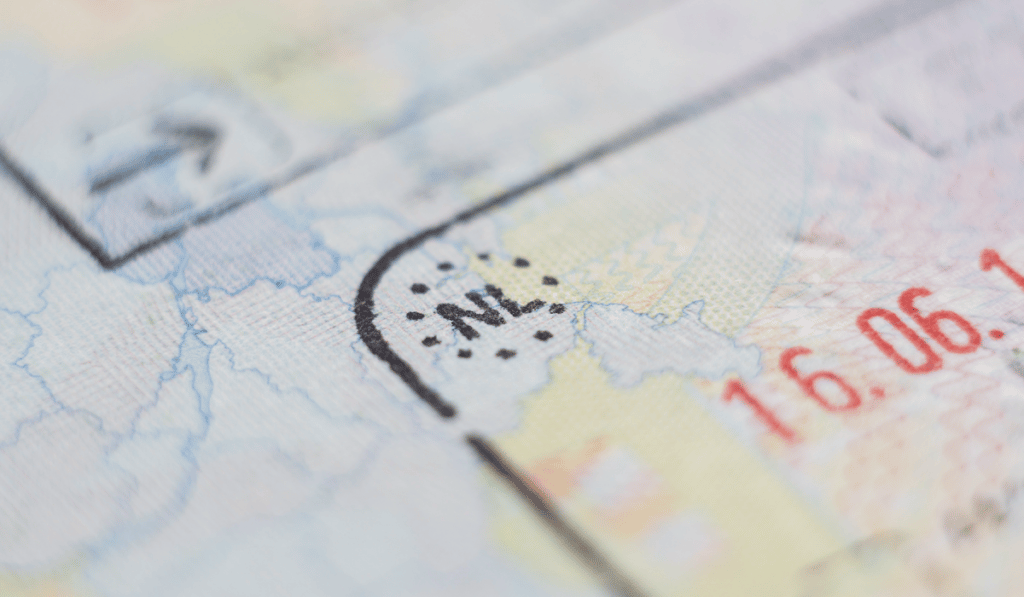
Just like any other country, those who wish to travel to the Netherlands will require a visa.
However, there are different types of visas available for those who want to travel to the Netherlands.
The type of visa you’ll need will depend on aspects such as your nationality, among other things.
The visa also depends on the duration of your stay, i.e., whether you stay longer than 90 days or not.
Note that there won’t be a requirement for a visa in the Netherlands if you are from:
— EU region
— Liechtenstein
— Norway
— Iceland
— Switzerland
There are, however, some conditions that apply even to individuals from these countries.
The IND (Immigration and Naturalisation Service) website has information about these conditions.
So, let’s say you are not from any of those countries, which visa will need?
As said before, that depends on factors such as the duration of your stay and purpose.
Let us discuss the different types of visas in the Netherlands.
Airport Transit Visa
As the name itself suggests, this visa is for people who are visiting the Netherlands on a layover.
The holder of this visa is allowed to stay at a Dutch airport while waiting for his/her flight to another country.
You should take into consideration that you are not allowed to leave the airport with this visa.
Moreover, whether or not the country allows you to stay during the layover period isn’t guaranteed.
The airline is held accountable for deciding whether or not you can catch another flight during a layover.
Schengen Visa
If you are from the member states of the Schengen area, you won’t likely need a visa to travel to the Netherlands.
For such individuals, only ID proof and a passport are required to enter the Netherlands.
On the other hand, you are required to have a Schengen visa if:
— You are from a country that does not have a visa liberalization agreement with the Schengen states.
Sometimes, a visa is needed even if you are from a country that has this agreement with the Netherlands.
This is when you were specifically rejected from entering the Netherlands or any other Schengen country.
A Schengen Visa is a short-stay visa, which allows you to stay for up to 90 days in the Netherlands.
Furthermore, this 90-day stay would only be valid for a period of six months.
Those who intend to stay for longer than 90 days in the Netherlands can opt for the Dutch National Visa. We’ll get to that later.
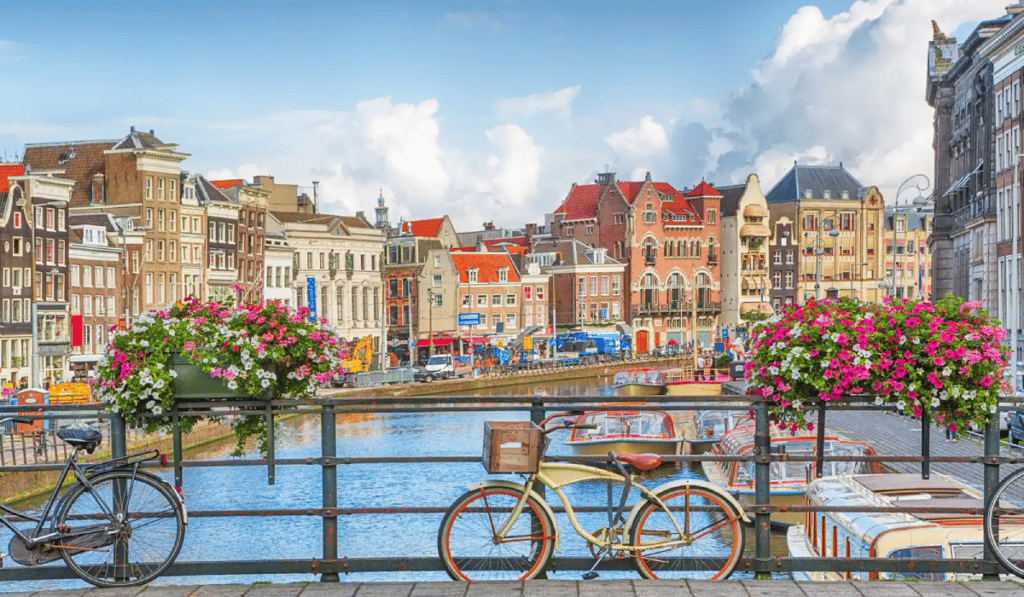
Documents needed
The requirements for those who want to apply for a short-stay Dutch visa, i.e., a Schengen visa, are:
— Dutch Visa Application
You should begin by submitting a Dutch visa application form. Note that this form is to be duly filled and signed after printing it out.
— Two Passport Photos
While providing these photos, remember that they should be no longer than three months.
Such photos should also satisfy the photograph requirements of the Dutch Schengen visa application.
— A Valid Passport
The passport should not be older than 10 years and have a validity of at least three months beyond the travel date to the Netherlands.
— Copies of Previous Visas
You should also attach copies of previous visas (if any) while applying.
— Netherlands Travel Health Insurance
You should also be able to prove that you have valid travel health insurance for the Netherlands and the Schengen area.
The minimum coverage needed for this travel insurance should be around €30,000.
— Round-Trip Flight Itinerary
A document containing the information that you have booked a flight to enter and leave the Netherlands.
This document should have all the necessary details such as flight dates, flight numbers, and your information.
— Proof of Accommodation
A valid proof determining the details of your stay in the Netherlands. This can be about a hotel reservation or the specific place that you’re renting.
— Proof of Civil Status
A birth certificate, marriage certificate, etc., are the types of documents to be provided as proof of civil status.
— Proof of Sufficient Income
You should prove that you have sufficient funds for covering your stay in the Netherlands. This means you must at least have €34 per each day you plan to spend in the Netherlands.
You might also need some other documents for visa application depending on your employment status.
The additional Dutch visa requirements based on your employment status are as follows.
For employed individuals:
— Employment contract
— Bank statements, which are to be submitted for the past six months
— Permission for a leave, which is obtained from the employer
— Income Tax Return form
For self-employed individuals:
— A copy of the business license
— Company bank statements, which are to be provided for the past six months
— Income Tax Returns
For Students:
— Proof of enrolment
— NOC from school or university
— Advertisements
For retired individuals:
— Pension statement, which should be provided for the past six months
If applicable, proof of regular income generated from a property is also needed (from the past six months).
The Schengen visa is further classified into sub-categories depending on the purpose of the visit.
— Airport Transit Schengen Visa
— Transit Schengen Visa
— Tourist Schengen Visa
— Schengen Visitor Visa
— Business Schengen Visa
— Student Schengen Visa
— Medical Schengen Visa
— Schengen Visa for Cultural, Sports, Film Crew or Religious Purposes
— Dutch Schengen Visa for the Husband/Wife of a Dutch Citizen
— Dutch Schengen Visa for Members of Official Delegations
To know more details about the general information or required documents for these, click here.
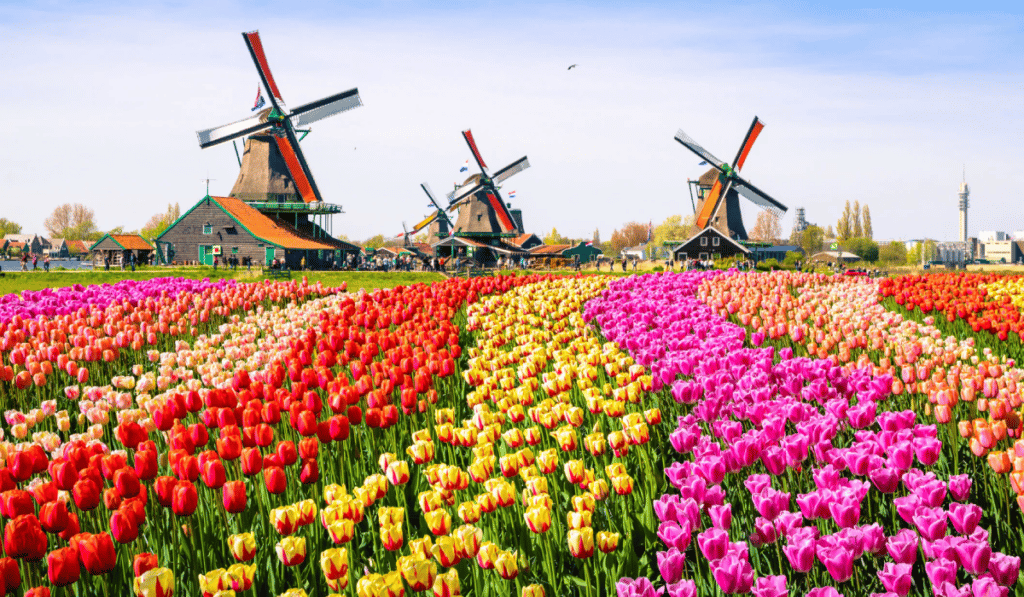
Orange Carpet Visa Facility
Orange Carpet Visa Facility allows business persons to make frequent visits to the Netherlands.
It is apt for business persons from the countries who need to travel to the Netherlands for business purposes.
The qualification criteria for this visa depend on the country in which your business is located.
The procedure for the orange carpet visa facility will be different from country to country.
The process is simple and requires fewer documents compared to the actual visa application.
After getting your biometrics successfully into the database, you will only need to renew it every five years.
There is no need to submit the application with an appointment as you can use the VIP counter.
Countries with access to the Orange Carpet Visa Facility in the Netherlands are:
— Brazil
— China
— Cuba
— Egypt
— Ethiopia
— India
— Indonesia
— Lebanon
— Pakistan
— Philippines
— Singapore
— Slovakia
— South Africa
— Tanzania
— Trinidad and Tobago
— Turkey
— UAE
— UK
— USA
— Vietnam
Caribbean Visas
A few Caribbean islands come into the category of Dutch territories. For visiting such countries, you’ll need to have a Caribbean Visa.
With the help of a Caribbean visa, you can visit the following Caribbean countries.
— Aruba
— Bonaire
— Curacao
— Saba
— St. Eustatius
— St. Maarten.
Just like the Dutch visas, Caribbean visas are for both short-stays as well as long-stays.
To get more details about Caribbean visas, visit Netherlands Worldwide.
Return Visa
You might have to travel overseas while living in the Netherlands, especially during emergencies. There can be varied reasons for this, such as a wedding, funeral or other similar reasons.
In those situations, what if your residence permit is stolen, lost or is still being processed? That’s when the return visa comes in so as to save the day. With this visa, you can travel and re-enter the Netherlands legally.
A return visa can even be used when your residence permit is invalid. Nonetheless, the return visa is only valid in the Netherlands, and cannot be used in other Schengen countries.
Provisional Residence Permit (MVV)
Sometimes, a short-stay visa will not be useful for you regarding your purpose of visit. This is especially when you want to stay more than 90 days in the country.
At such a time, you will need to apply for a Provisional Residence Permit (MVV). This allows you to travel to the country and stay for more than 90 days.
This is known in the Dutch as “machtiging tot voorlopig verblijf” or an MVV.
You will be allowed to apply for the provisional residence permit and residence permit at the same time.
Depending on your nationality, you may or may not be required to apply for an MVV.
Given below is a list of countries, whose nationals need not apply for an MVV.
— Australia
— Canada
— Japan
— Monaco
— New Zealand
— Vatican City
— United Kingdom
— United States of America
— South Korea
— Switzerland
— EU and EEA countries
Besides nationality, some situations also make an individual exempt from applying to an MVV.
The most common situations where you can become exempt are given below.
By visiting the IND website, you can get access to the list of situations exempt from an MVV.
How to apply for an MVV?
As I said earlier, you can apply for a provisional residence permit and a residence permit concurrently.
This is known by the name of Entry and Residence application or Toegang en Verblijf (TEV) in Dutch.
The people applying for a specific purpose of stay usually apply for this to live in the Netherlands.
Some of the common reasons for a visit include living with a family member, education, and employment.
Depending on the purpose of the visit, there are specific conditions for individuals to meet.
Besides that, you or your sponsor can apply for an MVV and residence permit.
A sponsor is an individual or an entity who requires you to travel to the Netherlands and stay there.
An educational institution or an employer can be considered an apt example of a sponsor. The sponsor can either complete the application process online or through the post.
If you apply by yourself, you will need to apply through the Dutch embassy or consulate located in your country.
If there is no Dutch embassy in your country, you can apply at a Dutch embassy in a neighbouring country.
After approval, one should be able to make an appointment at the embassy.
This should be done precisely within three months or else you have to start from the very beginning.
During the appointment at the embassy, you must also bring along your passport photo. The Dutch embassy will also collect your fingerprints. These will be used in the process of making your residence document.
An MVV is a visa sticker, which will be attached to your passport before your travel.
You should remember that the sticker will expire after 90 days. Therefore, make your Netherlands travel arrangements before these 90 days.
After arriving in the Netherlands, you can collect your provisional residence permit.
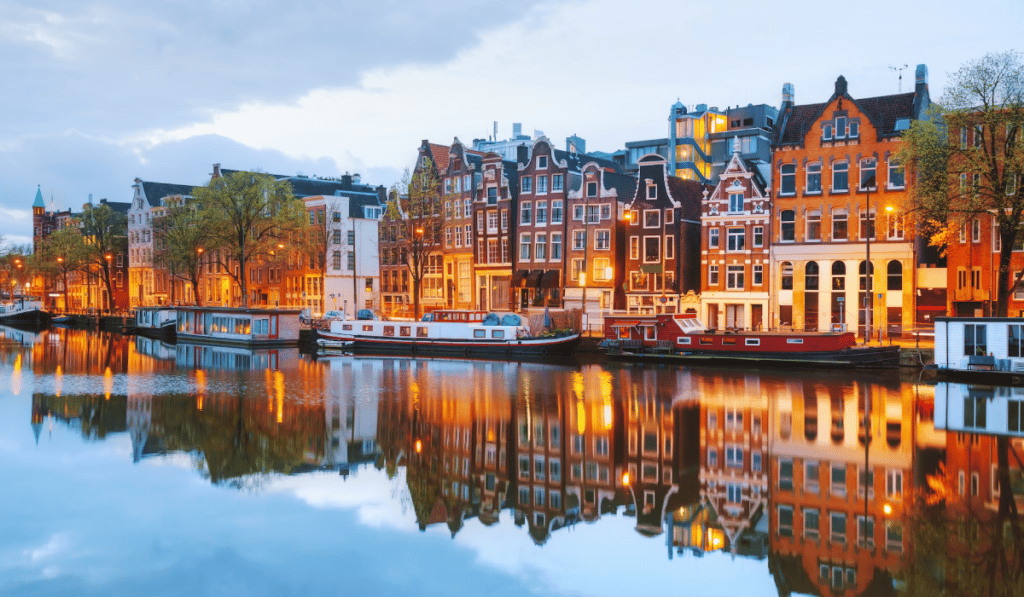
Work Permits
There are 2 types of work permits in the Netherlands, which are as follows.
First, there is the “tewerkstellingsvergunning”, also known as TWV (work permit).
The second one is the “gecombineerde vergunning voor verblijf en arbeid”, also called GVVA (combined residence and work permit).
The qualification criteria for both TWV and GVVA are the same. The permit needed by an individual would solely depend on the duration of their stay.
The citizens from EEA and Switzerland need not apply for any of these work permits.
Those who are not from the EU/EEA and Switzerland would require these to stay and work in the country.
A GVVA is for people who wish to stay in the country for more than three months. On the other hand, a TWV is for people who wish to stay in the country for less than three months.
You can get more details regarding the conditions, exemptions, and requirements by clicking here.
For entrepreneurs (Startup and Self-employed)
Startup Visa
For foreign entrepreneurs, the Netherlands has a residence permit for start-up entrepreneurs.
This permit has a validity of one year and allows an individual to start their business in the country.
Just like some other visas, citizens of EEA/EU and Switzerland are exempt from this.
To apply for a startup visa in the Netherlands, the conditions to be met are as follows.
— A valid passport.
— An individual should not be posing any threat to the public order or national security in the Netherlands.
— A tuberculosis test.
— Dutch health insurance.
— An agreement with a recognised facilitator in the country.
— Innovative product or service.
— A solid business plan.
Following that, they also need to register with the Chamber of Commerce (KVK) in the Netherlands.
This KVK’s main objective is to assist business owners to run their businesses.
A Citizen Service Number (BSN) is also needed and is provided upon registering with the Personal Records Database (BRP).
While in the Netherlands, BSN is used for a variety of reasons such as health insurance.
Finally, you must also have enough financial resources to support yourself during your stay. In general, savings in a bank account should suffice for this requirement.
To apply or know more details regarding the startup visa in the Netherlands, click here.
Self-employed visa
Those who are self-employed or freelancers need to apply for a self-employed visa in the Netherlands.
The startup visa serves those who wish to have an innovative business in the Netherlands. Whereas, the self-employed visa is for those who wish to have an innovative enterprise.
The major requirements to apply for a self-employed visa in the Netherlands are:
— Be a self-employed person while serving an essential interest of the nation.
— The livelihood of the individual from their endeavours should be sustainable and independent.
— Qualify for the eligibility requirements related to the following:
1. Performance of the work
2. Conducting the business
These requirements (if applicable) will be according to Article 3.30(1) Aliens Decree 2000.
The individuals applying for the self-employed visa should also meet the criteria of a points-based system.
This points system is based on three categories, i.e., personal experience, business plan, and added value for the Netherlands.
To apply or know more details regarding the self-employed visa in the Netherlands, click here.
Residency for Foreign Investors
Foreign individuals can also obtain residency in the Netherlands through investment. For this, they must invest an amount of at least €1,250,000 in a Dutch business.
This type of visa is known by the name “Netherlands Investor Visa” or “Netherlands Golden Visa”.
Let us have a detailed insight into the Netherlands Golden Visa for better understanding.
As said, it is apt for entrepreneurs who have sufficient funds to make an investment. However, such individuals are required to meet certain conditions to get this visa.
Here are the requirements for obtaining a Netherlands Golden Visa.
To begin with, the minimum investment amount to obtain this visa is €1,250,000. This can either be invested in a company or an investment fund recognized by the Ministry of Economic Affairs.
Individuals cannot obtain this visa when the investment has been made in a real estate property. Neither can it be obtained by making an investment for private purposes in the Netherlands.
The investment amount is to be deposited into a Dutch bank account. Alternatively, it can also be deposited into a foreign bank’s branch in the Netherlands.
Another major requirement is that the investment should add value to the Dutch economy. By this, I mean that it would be assessed by the Netherlands Enterprise Agency.
Given below are the criteria, among which at least two conditions must be satisfied to get this permit.
— At least 10 jobs should be created for the Dutch people within five years after the investment.
— Investment should be made in a Dutch company that enhances its innovativeness.
Some of the leading innovative sectors in the Netherlands are:
1. Horticulture and propagation materials
2. Agri-food
3. Water
4. Health and life sciences
5. Chemicals
6. High tech
7. Energy
8. Logistics
9. Creative industries
— Finally, there should be some non-financially added value from the investor. This refers to specific skills, knowledge, networking and active involvement of the investor.
The investment is to be legitimate and should be obtained from legal sources under the individual’s name. This is a result of the Netherlands’ measures against money laundering.
The applicant may also be asked by the authorities to prove the origin of his/her funds.
The applicant should not have been illegally staying in the Netherlands. Furthermore, the applicant should provide accurate details and should not withhold any information.
How to apply?
To apply for this permit, one must travel to the Netherlands and submit the relevant application form.
After that, the investment of the individual will be reviewed. Because of this reason, the individual (sometimes) has to obtain a provisional residence permit first.
Whether or not an individual needs to get an MVV first will depend on their nationality.
Those who do not need an MVV can travel to the Netherlands and take care of this process during their stay.
After successfully submitting an application, IND takes around 90 days to offer its approval.
If approved, the applicant can receive their residence permit in the Netherlands.
Upon receiving it, they should register with the Municipal Personal Records Database. This should be done in the Dutch municipality in which they wish to reside.
It is important for a person to get health insurance after they get the residence permit.
The Netherlands investor visa is valid for a period of three years. This period of validity can be extended to a maximum of five years by the IND.
To access the application form for admission and residence as a foreign investor, click here.
Please note that the above-mentioned link is only for those who need an MVV as well.
If you fall under the category of an applicant who is already living in the Netherlands, then click here.
This form is known as the application for the purpose of residence of a wealthy foreign national.
The costs related to this permit (first application and change in the purpose of stay) are around €2,331. The extension costs €1,166.
If you have “arbeid vrij toegestaan” on the back of your residence permit, then you are permitted to work.
However, those with a resident permit of wealthy foreign national do not need a work permit.
Dutch Citizenship
In the Netherlands, citizenship can be acquired in various ways such as:
— Birth, Acknowledgement or Adoption
— Naturalisation
— Option
— Dutch citizenship outside the Netherlands or in the Netherlands Caribbean
— Regaining Nationality
Let us have a brief look at each of these methods to have a better understanding.
Birth, Acknowledgement or Adoption
Individuals who were born after 31st December 1982 can get Dutch citizenship in the following situations.
— The mother of the individual was a Dutch citizen during the birth.
— Both the parents of the individual were Dutch nationals at the time of birth.
— The individual’s father was a Dutch national at the time of birth, even if the individual was born to a non-Dutch mother.
The mother can be a legal spouse or a registered partner of the Dutch father. Otherwise, being acknowledged by the father before the birth of a child should also suffice.
— The individual and their father/mother were living in the Netherlands while having it as their principal residence.
In such a scenario, the father or mother’s parents should also have their principal residence in the Netherlands.
Those who were born before January 1st 1985 can get citizenship through descent if the father was a citizen.
In this case, individuals with their mother as a citizen while their father was not cannot get Dutch citizenship.
If a child was born after 1st March 2009 and the Dutch parent acknowledged the child, then the child is a Dutch citizen.
For this to happen, the child must be of an age which should not exceed seven years.
If the child was more than seven years old and under 18 years, there will be a DNA test. This is to prove that the Dutch citizen is the biological parent of that child.
Those who don’t want to go through a DNA test can opt for citizenship through option.
If that’s the case, the Dutch parent should have cared for the child for at least three years. The child must be under the age of 18 years for this scenario.
Children born from 1st April to 1st March 2009 cannot obtain citizenship through acknowledgement.
Such children and those who turned 18 or more have to go through another scheme to be acknowledged.
Dutch citizenship can also be obtained when the Dutch parent adopts a child.
Such people can apply for a passport or identity card on behalf of their child, even when the child is overseas.
Citizenship through option
Individuals can obtain Dutch nationality via a request for option under the following circumstances.
— Individuals who are living in the Netherlands with a valid residence permit.
— Individuals who are living in the Netherlands as an EU/EEA/Swiss national.
Citizenship for those living outside the Netherlands or in the Netherlands Caribbean
Individuals living outside of the Netherlands or those living in the Netherlands Caribbean country with a residence permit can also get citizenship.
Regaining Citizenship
People who lose their Dutch citizenship can get it back through option or naturalisation.
Citizenship through Naturalisation
People can apply for Dutch Citizenship through Naturalisation under the following circumstances.
— Individuals who are living in the Netherlands with a valid residence permit.
— Individuals who are living in the Netherlands as an EU/EEA/Swiss national.
— Individuals living outside of the Netherlands or those living in the Netherlands Caribbean country with a residence permit can also get citizenship.
To access more details regarding Dutch Citizenship through Naturalisation, click here.
Bottom Line
In this guide, I have mentioned each and every aspect related to visas, Residency, and Citizenship in the Netherlands.
Furthermore, I also provided relevant links that will redirect the readers to the appropriate web pages.
I strongly hope that you found this information beneficial, especially if you were finding something related to these topics.
Are you facing financial difficulties and want to find a solution for your financial needs?
Do want to find an expert who can take care of your financial planning/wealth management requirements?
Don’t worry. I hear you. I’m here to help.
You can benefit from the best-in-class financial services that I offer, especially if you fall under those categories.
Don’t hesitate to contact me if you want to find out whether you can benefit from my services.
Pained by financial indecision? Want to invest with Adam?

Adam is an internationally recognised author on financial matters with over 830million answer views on Quora, a widely sold book on Amazon, and a contributor on Forbes.

